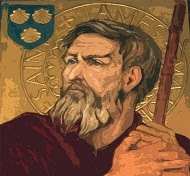Difference between revisions of "James the Just"
(Created page with 'File:lighterstill.jpg James (Hebrew: יעקב Ya'akov; Greek Ἰάκωβος Iákōbos), first [http://en.wikipedia.org/wiki/Early_centers_of_Christianity#Jerusalem Bish...') |
m (Text replacement - "http://" to "https://") |
||
| (4 intermediate revisions by 2 users not shown) | |||
| Line 1: | Line 1: | ||
| − | [[File:lighterstill.jpg]] | + | [[File:lighterstill.jpg]][[File:Stjames_-_Version_2.jpg|right|frame]] |
| − | James (Hebrew: יעקב Ya'akov; [[Greek]] Ἰάκωβος Iákōbos), first [ | + | James (Hebrew: יעקב Ya'akov; [[Greek]] Ἰάκωβος Iákōbos), first [https://en.wikipedia.org/wiki/Early_centers_of_Christianity#Jerusalem Bishop of Jerusalem], who died in 62 or 69, was an important figure in [https://en.wikipedia.org/wiki/Early_Christianity Early Christianity]. He is distinguished from the [[James, the Apostle|Apostle James]], son of Zebedee by various epithets; he is called ''James the brother of the Lord'' by [[Paul, the Apostle|Paul]] (Galatians 1:19), James the brother of the Lord, surnamed the Just by [https://en.wikipedia.org/wiki/Hegesippus_(chronicler) Hegesippus] and others, "''James the Righteous''", "''James of Jerusalem''", "''James Adelphotheos''" (Ἰάκωβος ὁ ἀδελφόθεος), and so on. |
| − | |||
| − | |||
| + | James became the [[leader]] of the [https://en.wikipedia.org/wiki/Early_centers_of_Christianity#Jerusalem Christian movement] in [[Jerusalem]] in the decades after [[Jesus' death]], but like the rest of the early Christians, [[information]] about his life is scarce and [[ambiguous]]. Apart from a handful of references in the Gospels, the main sources for his life are the [[Acts of the Apostles]], the [https://nordan.daynal.org/wiki/index.php?title=New_Testament#Pauline_epistles Pauline epistles], the historian [https://en.wikipedia.org/wiki/Josephus Josephus], and [https://en.wikipedia.org/wiki/St._Jerome St. Jerome] who also quotes the early Christian chronicler [https://en.wikipedia.org/wiki/Hegesippus_(chronicler) Hegesippus]. The [https://nordan.daynal.org/wiki/index.php?title=Letters_to_James Epistle of James] in the [[New Testament]] is traditionally attributed to him, and he is a principal author of the [https://en.wikipedia.org/wiki/Apostolic_Decree Apostolic Decree] of [https://nordan.daynal.org/wiki/index.php?title=Acts_of_the_Apostles#Acts.15 Acts 15]. In the extant lists of [https://en.wikipedia.org/wiki/Hippolytus_of_Rome Hippolytus of Rome], [https://en.wikipedia.org/wiki/Dorotheus_of_Tyre Dorotheus of Tyre], the [https://en.wikipedia.org/wiki/Chronicon_Paschale Chronicon Paschale], and [https://en.wikipedia.org/wiki/Dimitry_of_Rostov Dimitry of Rostov], he is the first of the [https://en.wikipedia.org/wiki/Seventy_Apostles Seventy Apostles], though some sources, such as the Catholic Encyclopedia,] draw the conclusion that "these lists are unfortunately worthless". | ||
| + | <center>For lessons of '''''James the Just''''', follow [https://nordan.daynal.org/wiki/index.php?title=Category:James_the_Just '''''this link'''''].</center> | ||
Hegesippus in his fifth book of his Commentaries, writing of James, says "After the apostles, James the brother of the Lord surnamed the Just was made head of the Church at Jerusalem."[4] | Hegesippus in his fifth book of his Commentaries, writing of James, says "After the apostles, James the brother of the Lord surnamed the Just was made head of the Church at Jerusalem."[4] | ||
| − | As a consequence of the doctrine of [ | + | As a consequence of the doctrine of [https://en.wikipedia.org/wiki/Perpetual_virginity perpetual virginity], which does not allow that [[Mother Mary|Mary]] had children after [[Jesus]], Jerome considered that the term "brother" of the Lord should be read "cousin", and concluded that James "the brother of the Lord," ([https://nordan.daynal.org/wiki/index.php?title=The_Letter_of_Paul_to_the_Galatians#The_Letter_of_Paul_to_the_Galatians.2C_I Gal.1:19]) is therefore [[Alpheus Twins|James, son of Alphaeus]], one of [[the Twelve Apostles]] of Jesus, as well as James, the son of Mary Cleophas.[5] He is not, however, identified with [https://en.wikipedia.org/wiki/James_the_Great James the Great]. Some Protestant groups claim the Matthew 1:25 statement that Joseph "knew her not till she had brought forth her firstborn son" to mean that Joseph and Mary did have normal marital relations after Jesus' birth, and that James, Joses, Jude, and Simon were the biological sons of Mary and Joseph; and, thus, Jesus' half-brothers.[https://en.wikipedia.org/wiki/James,_brother_of_Jesus] |
| − | + | ==See also== | |
| + | *'''''[[190:2 Jesus' Appearance at Bethany|The Call of James, brother of Jesus]]''''' | ||
[[Category: History]] | [[Category: History]] | ||
[[Category: Religion]] | [[Category: Religion]] | ||
| + | [[Category: Teacher Corps]] | ||
Latest revision as of 01:19, 13 December 2020
James (Hebrew: יעקב Ya'akov; Greek Ἰάκωβος Iákōbos), first Bishop of Jerusalem, who died in 62 or 69, was an important figure in Early Christianity. He is distinguished from the Apostle James, son of Zebedee by various epithets; he is called James the brother of the Lord by Paul (Galatians 1:19), James the brother of the Lord, surnamed the Just by Hegesippus and others, "James the Righteous", "James of Jerusalem", "James Adelphotheos" (Ἰάκωβος ὁ ἀδελφόθεος), and so on.
James became the leader of the Christian movement in Jerusalem in the decades after Jesus' death, but like the rest of the early Christians, information about his life is scarce and ambiguous. Apart from a handful of references in the Gospels, the main sources for his life are the Acts of the Apostles, the Pauline epistles, the historian Josephus, and St. Jerome who also quotes the early Christian chronicler Hegesippus. The Epistle of James in the New Testament is traditionally attributed to him, and he is a principal author of the Apostolic Decree of Acts 15. In the extant lists of Hippolytus of Rome, Dorotheus of Tyre, the Chronicon Paschale, and Dimitry of Rostov, he is the first of the Seventy Apostles, though some sources, such as the Catholic Encyclopedia,] draw the conclusion that "these lists are unfortunately worthless".
Hegesippus in his fifth book of his Commentaries, writing of James, says "After the apostles, James the brother of the Lord surnamed the Just was made head of the Church at Jerusalem."[4]
As a consequence of the doctrine of perpetual virginity, which does not allow that Mary had children after Jesus, Jerome considered that the term "brother" of the Lord should be read "cousin", and concluded that James "the brother of the Lord," (Gal.1:19) is therefore James, son of Alphaeus, one of the Twelve Apostles of Jesus, as well as James, the son of Mary Cleophas.[5] He is not, however, identified with James the Great. Some Protestant groups claim the Matthew 1:25 statement that Joseph "knew her not till she had brought forth her firstborn son" to mean that Joseph and Mary did have normal marital relations after Jesus' birth, and that James, Joses, Jude, and Simon were the biological sons of Mary and Joseph; and, thus, Jesus' half-brothers.[1]
